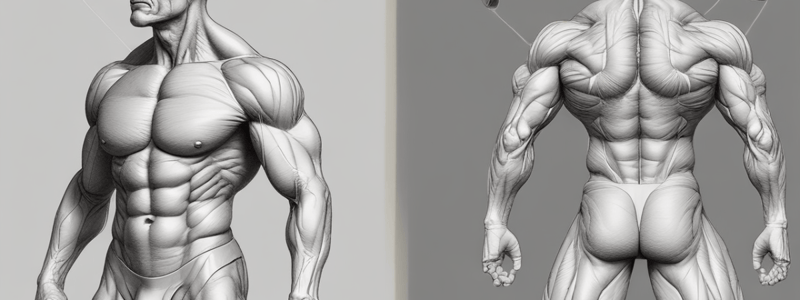Podcast
Questions and Answers
What is muscle hypertrophy?
What is muscle hypertrophy?
- The shrinking of muscle fibers
- The shortening of muscle fibers
- The weakening of muscle fibers
- The enlargement of muscle fibers (correct)
How long until glycogen reserves are depleted during vigorous physical activity?
How long until glycogen reserves are depleted during vigorous physical activity?
- 2 hours (correct)
- 4 hours
- 30 minutes
- 1 hour
What should be the composition of the pregame meal for athletes?
What should be the composition of the pregame meal for athletes?
- High in complex carbohydrates and moderate in protein (correct)
- Low in carbohydrates
- High in fiber and protein
- High in simple sugars and fats
What nutrient is depleted most rapidly with exercise?
What nutrient is depleted most rapidly with exercise?
What substance builds up in tissues when deprived of oxygen?
What substance builds up in tissues when deprived of oxygen?
Who is at risk for sports anemia?
Who is at risk for sports anemia?
What type of diet promotes superior performance in athletes and raises glycogen concentration?
What type of diet promotes superior performance in athletes and raises glycogen concentration?
What is the best way to stay hydrated during physical activity?
What is the best way to stay hydrated during physical activity?
Flashcards
Muscle Atrophy
Muscle Atrophy
Muscle mass loss due to disuse or disease.
Muscle Hypertrophy
Muscle Hypertrophy
Increase in muscle mass from exercise and nutrition.
Progressive Overload
Progressive Overload
Gradually increasing weight/resistance to build strength/endurance.
Cardio-Respiratory Conditioning
Cardio-Respiratory Conditioning
Signup and view all the flashcards
Energy Systems
Energy Systems
Signup and view all the flashcards
Nutrition for Athletes
Nutrition for Athletes
Signup and view all the flashcards
Hydration in Exercise
Hydration in Exercise
Signup and view all the flashcards
Resistance Training for Strength vs. Endurance
Resistance Training for Strength vs. Endurance
Signup and view all the flashcards
Study Notes
Components of Fitness
- There are three components of fitness.
Muscle Growth and Atrophy
- Muscle atrophy is the decrease in muscle mass due to lack of use or disease.
- Muscle hypertrophy is the increase in muscle mass due to intense exercise and nutrition.
Progressive Overload Principle
- The progressive overload principle is the gradual increase in weight or resistance to build muscle strength and endurance.
Cardiorespiratory Conditioning
- Cardiorespiratory conditioning benefits include improved heart health, increased stamina, and enhanced overall fitness.
- To see benefits, cardio-respiratory endurance episodes should be sustained for at least 15-20 minutes.
Resistance Training
- To adjust weight training for muscle strength vs muscle endurance, use heavier weights with lower reps for strength and lighter weights with higher reps for endurance.
- Resistance or strength exercises should be incorporated at least 2-3 times per week.
Energy Systems
- There are three energy systems: ATP-PC, Anaerobic, and Aerobic.
- The ATP-PC system uses ATP as a fuel, the Anaerobic system uses glucose, and the Aerobic system uses glucose, fatty acids, and ketones.
Nutrition for Athletes
- A high-carbohydrate diet promotes superior performance in athletes and raises glycogen concentration.
- Lactic acid builds up in tissues when they are deprived of oxygen.
- During vigorous physical activity, glycogen reserves are depleted within 1-2 hours.
- When a runner "hits the wall", glycogen is depleted.
- After 20 minutes of moderate-intensity physical activity, fatty acids are used predominantly by muscle cells.
- Carbohydrates have the greatest need in exercise and are depleted most rapidly.
Hydration
- A loss of 2% of body water can affect physical performance.
- The pre-game meal should consist of a balance of carbohydrates, protein, and healthy fats.
- Sports beverages are recommended for intense, long-duration activities or in high-heat conditions.
- Athletes who engage in high-intensity, long-duration activities are at risk for sports anemia.
- The best way to stay hydrated during physical activity is to drink water or a sports beverage every 15-20 minutes.
Studying That Suits You
Use AI to generate personalized quizzes and flashcards to suit your learning preferences.




